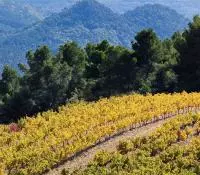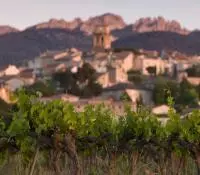AOC Côtes du Rhône Villages Roaix
At the heart of the Côtes du Rhône lies a huge hill of clay limestone. Its southern face is shared by two Crus: Cairanne to the west, Rasteau to the east. But follow the hill eastwards past Rasteau, and you come to the neighbouring village of Roaix. It’s a tiny settlement, totally surrounded by vines; over 85% of the cropland is devoted to vines.
Well, when you know you’re winning you go all in.
This is a paradise not just for vines, but for walkers.
Start at the sandy terraces below the village and work your way up to the pebbly hilltop and you’ll be blessed with the most amazing mountain views along the way. Uncork a bottle of red Roaix at the top and you’ll find a wine similar in style to its two famous neighbours, but not identical. Rasteau’s south facing vines sunbathe all day, but in Roaix the vines face east, taking in the morning rays before seeking afternoon shade.
The result is a juiciness and depth combined with divine drinkability.
Whites and rosés are made in tiny amounts, but the results never fail to impress – the white wines in particular have tremendous character. Spurred on by their success, perhaps winemakers will plant more white grapes. If they can find room!

Informations
Climate: Mediterranean lightly influenced by Mistral
Soils: Limestone / Clay
Website appellation: https://www.cotesdurhone.com/
Key figures
Production surface area in 2023: 138 HA
Total production in 2023: 4 272 HL
Average annual yeld: 31 HL/HA
Year of recognition within the AOC Côtes du Rhône Villages: 1967
Commune: Roaix
Grape varieties
Main grape varieties
- Bourboulenc,
- Clairette,
- Grenache blanc,
- Grenache noir,
- Marsanne,
- Mourvèdre,
- Roussanne,
- Syrah,
- Viognier
Secondary grape varieties
- Bourboulenc,
- Brun argenté (locally known as Camarèse or Vaccarèse),
- Carignan,
- Carignan blanc,
- Cinsault,
- Clairette,
- Clairette rose,
- Counoise,
- Floréal,
- Grenache blanc,
- Grenache gris,
- Marsanne,
- Muscardin,
- Piquepoul blanc,
- Piquepoul noir,
- Rolle (or Vermentino),
- Roussanne,
- Terret noir,
- Ugni blanc,
- Vidoc,
- Viognier
To know
History
Roaix lies on the tin route, which passed through the Rhône Valley during the Bronze Age, while remains of an underground hypogeum (burial
site) confirm there was a settlement here in the Copper Age. In the 12th century, the Knights Templar established a Commanderie at Roaix and developed winegrowing in the area; when the order was dissolved, Roaix became the property of the Avignon Popes, breathing new life into the
vineyards.
The Roaix-Séguret wine cooperative was established in 1960, and Roaix was awarded Côtes du Rhône Villages Roaix appellation status in 1967.
Climate
Mediterranean type climate influenced by the Mistral wind.
Soils
Limestone/clay soils, the stony terraces of the Ouvèze Tributaries and slopes of decalcified red clay.
Geography
The Roaix vineyards, tucked between those of Rasteau and Séguret, lie in the commune of Roaix, in the Vaucluse département.
Varieties and flavours
The red wine blend must include Grenache noir.
Along with Syrah and Mourvèdre, these three main varieties must represent at least 66% of red blends. In their youth, their bouquet display
aromas of red and black fruits, before evolving over time towards notes of leather and truffles.
These wines are very well and can be kept for over 10 years.
Made by saignée or direct press, the rosés of Côtes du Rhône Villages Roaix can be kept up to 2 years.
In white wines, Grenache blanc, Clairette, Marsanne, Roussanne, Bourboulenc and Viognier dominante the blends.
Associated appellations


